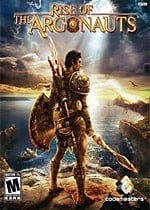Hack, Slash, and Role Play
The RPG genre has been so successful because it combines two things nerds love: numbers and stories about sword-wielding guys who meet well-built women in skimpy outfits. Some RPGs add live-action combat to this potent mix, injecting some adrenaline and drawing in the less-nerdy among us.
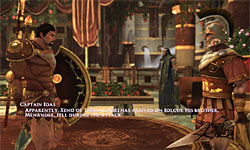
The problem with these “action-RPGs” though, is that they’re quite challenging to get right. Developers must not only deliver all three elements (quantifiable character attributes that improve over time, storytelling, and fight scenes), but they must also balance them. When it works, it’s genius, but it most definitely does not work in Rise of the Argonauts. None of the three elements are executed competently, plus there’s too little attribute-improvement and too much storytelling. Add to this some basic failures of game design, and Argonauts is very flawed indeed.
The game’s premise is initially intriguing. The tale comes from a Greek myth about Jason, the son of the rightful king of Lolcus. In the game (whose plot departs substantially from the myth), an assassin shoots Alceme, Jason’s wife. After killing the murderer, Jason decides he’d like to resurrect Alceme, but to do so he needs the legendary Golden Fleece. He sets out on a quest for the Fleece, facing a variety of foes along the way, including the Blacktongues responsible for murdering his wife. As the story unwinds, he meets and fights alongside a variety of figures from Greek mythology, including Hercules and Achilles.
You learn all this through dialogue… lots and lots of dialogue. You’ll talk to tons of people, and there’s no way to skip many of the lengthy conversations. You’ll make some choices (for example, if your dialogue partner mentions several topics you need to learn about, you’ll pick the one you’d like to hear next), but rarely do they affect the game’s trajectory.
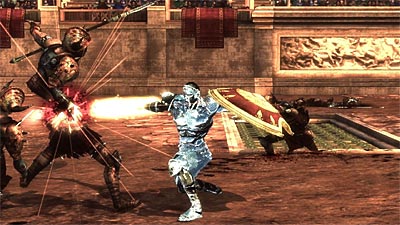
As you make your way through this quest, you’ll “level up” your character’s attributes, as you’d expect from an RPG. However, these attributes aren’t numbered; you’ll simply get better and better things as you move along, like you would in a plain old action/adventure game. You usually just stumble upon the new weapons. To improve your other abilities, you have to complete various tasks, some as simple as choosing certain dialogue options. This earns you “deeds,” which you can “dedicate” to several gods. If you honor a given god with enough deeds, you’ll get a point you can use to buy an “aspect.” The aspects will help you out during combat; for example, one makes your sword do more damage against enemy shields.
This system works, and by the end of the ten-hour experience, you feel downright heroic in power. However, regular RPG players will feel let down by the lack of depth. There’s no “grinding” needed (you won’t be killing weak enemies repeatedly to build up power and take on a strong boss) and no intricate number schemes to work out. Leveling up just happens during the game; it’s nothing you spend any time thinking or worrying about. No one will brag that they achieved this or that level or earned this or that skill.
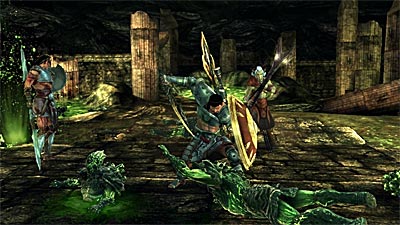
The fighting system has the same problem: it does what it needs to do, but it doesn’t go beyond that to provide a truly gripping experience. During fights, you can do strong and quick attacks with whatever weapon you’ve equipped, push enemies away with your shield, and evade enemies with a roll. You carry a mace, a sword, and a spear, and can find more powerful versions of them, or make them more powerful with aspects. You can switch weapons in mid-combo to take out enemies faster. In lieu of a traditional HUD, you tell how much life you have left by how hurt you look, though you can turn on a life bar if you want.
That’s well and good, and the control setup is intuitive and responsive. When it comes right down to it, though, walking up to an opponent and hammering the buttons works perfectly well. You soon catch on to each enemy style, and aside from some basic strategy and timing (making sure you’re only fighting one enemy at once when possible, pushing enemies away or rolling when it gets crowded, avoiding bosses’ attacks, etc.), there’s not much to it. Even when you run out of life, you don’t die right away; if you can avoid taking damage for a little bit, you’ll regenerate health. The hacking and slashing is still fun, especially given the generous splashes of blood, but it never feels like you’re accomplishing anything.
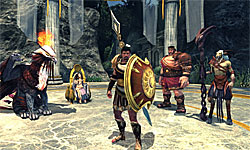
All these flaws stem from the difficulty of making a good action-RPG, so they’re at least understandable, if not forgivable. The additional problems are less so: Argonauts doesn’t even get the basics of game design right. One issue the developers should have resolved is that in order to see the map, you have to pause, wait a split-second for the menu to load, and select “Map.” Considering you’ll be exploring a relatively big world, traveling from one icon on that map to another, you’ll be doing this a lot. There should be a mini-map on the screen at all times, or at least one a single button press away.
Also, the pacing is terrible. The game begins with Alceme’s murder, and it proceeds to a series of fights that help you get a grip on the controls. From there, though, there’s a huge span in which you’re doing nothing but walking around and talking to people. In a lot of places, the game feels like long periods of boredom peppered with occasional battles.
Then there’s the awful voice acting that accompanies the hours of conversation. Sometimes the actors have the writers to blame; no one could make the words “That Blacktongue called you Medea. I assume that’s your name?” seem unscripted. Yet just as often, they prove able to make the simplest statements sound self-conscious and unnatural. It doesn’t help that the character models’ faces and lips don’t move quite right, either.
Perhaps most noticeable are the constant graphical glitches. The developers used the Unreal Engine 3, which allowed them to create detailed and good-looking environments based on research into Greek history. As soon as you walk through the world and move the camera around, however, you’ll experience some serious framerate drops. When you cover a lot of ground quickly, the game will sometimes stop entirely and take a second to load. It’s a very distracting problem, and one that should have been fixed.
If there’s an upside to this game, it’s that despite the shallow combat system, it’s rather amusing to spill blood in battle. That’s a small upside for a game that costs $60 and demands you sit through hours of talking just to kill stuff.
RATING OUT OF 5 RATING DESCRIPTION 2.3 Graphics
The environments tend to look good, but the severe framerate issues make this game hard to watch. 4.7 Control
No complaints. 2.0 Music / Sound FX / Voice Acting
The voice actors sound cheesy and self-conscious, and you have to listen to them a lot. 3.3 Play Value
It’s reasonably fun to hack your way through battles, but the combat system is shallow, and you have to sit through lots of conversation just to get to each fight. 2.7 Overall Rating – Average
Not an average. See Rating legend above for a final score breakdown.
Game Features:
